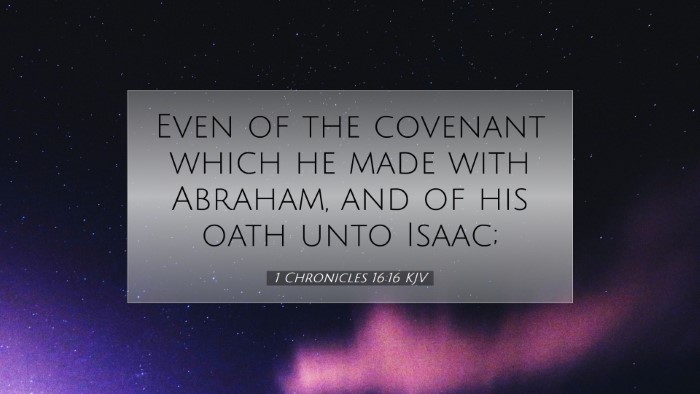Commentary on 1 Chronicles 16:16
Bible Verse: “Even of the covenant which he made with Abraham, and of his oath unto Isaac.” (1 Chronicles 16:16)
Introduction
This verse highlights God’s faithfulness and the covenant promises made to Isaac and Abraham. It serves as a reminder of the perpetual nature of divine promises across generations. This commentary draws insights from esteemed public domain commentaries to reflect on the theological and historical implications of this passage.
The Significance of the Covenant
The notion of covenant is central in the biblical narrative, acting as a divine agreement that binds God with His chosen people. In 1 Chronicles 16:16, the explicit mention of God’s covenant with Abraham, and the oath made to Isaac, reinforces His unwavering commitment and reliability.
-
Matthew Henry’s Perspective:
Matthew Henry emphasizes the idea that the covenant made with Abraham was not merely for Abraham's sake, but extended to his descendants. This notion of continuity highlights God's promise as a foundational element in the history of Israel. Henry notes that God's faithfulness in fulfilling His promises is a theme that permeates Scripture, offering believers assurance of divine commitment.
-
Albert Barnes’ Insight:
Albert Barnes reflects on the significance of oaths in the biblical context, emphasizing that they affirm the reliability of God’s promises. The oath to Isaac signifies a personal aspect of God's covenant promise, indicating that God’s blessings and chosen status are not random but specific. Barnes concludes that understanding this covenant is essential for grasping God's redemptive plan.
-
Adam Clarke’s Analysis:
Adam Clarke elaborates on the covenant's implications, noting that God's choice of Abraham and His promises to Isaac were pivotal moments in Israel's history. Clarke underscores that the chronicles reflected on God's faithfulness through generations, providing a sense of hope and continuity for the people of Israel, urging believers to recognize their heritage as a testament to God's sovereignty.
Theological Implications
1 Chronicles 16:16 serves as both a historical and theological anchor. It encapsulates several key doctrines relevant to theology today.
-
Divine Faithfulness:
The unwavering nature of God in fulfilling His promises is a bedrock of the Christian faith. It reassures believers that God’s word can be trusted, transcending time and circumstances.
-
Covenant Theology:
This verse enriches understanding in covenant theology, illustrating how God’s promises are fulfilled in successive generations, which is vital for comprehending both the Old and New Testaments.
-
Historical Continuity:
Recognizing the link between Abraham, Isaac, and the Israelite community enhances understanding of biblical history and the unfolding of God’s redemptive narrative throughout time.
Application for Believers
Pastors, students, and theologians can draw several applications from this verse:
-
Trust in God’s Promises:
Just as God was faithful to Abraham and Isaac, believers today are encouraged to trust in the promises of God, remaining steadfast in faith despite temporal challenges.
-
Understanding Heritage:
This verse challenges believers to explore their spiritual heritage, connecting their faith to the biblical narrative and recognizing the continual line of God’s promise through history.
-
Encouraging Faithfulness:
In a world where commitments can often falter, believers are called to reflect God’s faithfulness in their own lives, encouraging consistency and reliability in relationships and ministry.
Conclusion
1 Chronicles 16:16 provides profound insights into God's covenant with Abraham and Isaac, serving as a testament to His faithfulness and mercy. By drawing on public domain commentaries by Matthew Henry, Albert Barnes, and Adam Clarke, we gain a deeper appreciation for the significance of this verse. It not only reinforces theological doctrines but also encourages practical applications for contemporary faith communities, reminding us of the enduring nature of God's promises.


